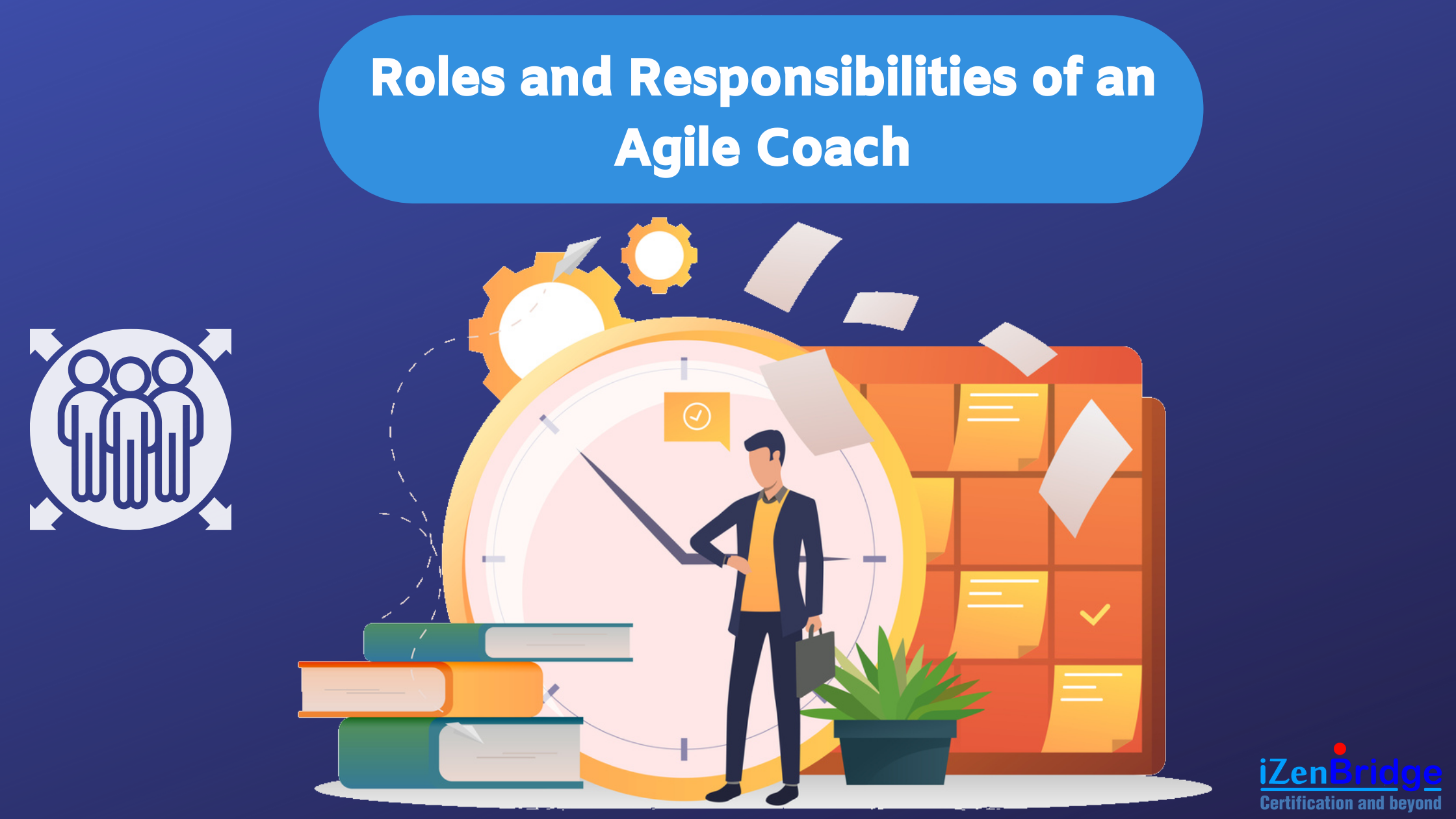

Our blog on “What is Agile Coaching?” highlights our views on the Agile Coaching. In general, we find it helpful to look into five patterns on the agile coaching role. These five patterns are Agile Team Coach, Agile Coach-Process, Agile Coach-Delivery, Enterprise Agile Coach, and Specialized Agile Coach.
In this blog, we are going to explore the roles and responsibilities of three main patterns of the Agile coaching role, Agile Coach-Process, Agile Coach-Delivery, and Enterprise Agile Coach.
Role:
A multi-team Agile process coach empowers the organization to adopt Agile as a culture shift. The Agile coach uses his experience and influencing abilities to affect the change from a command-and-control culture to a collaborative one. He works at a tactical level with individual members of Agile teams enhancing their proficiency in executing a Scrum process. He is an Agile process champion for multiple teams who enables agility by improving ways of working.
Responsibilities:
KPI
This is an example where you see more focus on governance type of activities.
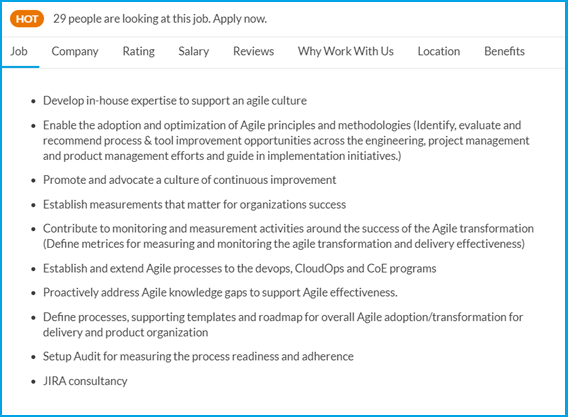
In the above example, the Agile process coach is required to equip in-house teams to support an Agile culture. The organization expects Agile implementation across engineering, product management, and project management in addition to DevOps, CloudOps, and COE programs.
The Agile process coach is responsible for defining the processes, templates, and roadmap for product and delivery organizations. Based on these, he identifies the relevant process and tool improvement opportunities to be adhered to. Collaboration between teams is achieved through JIRA consultancy.
For effective Agile transformation, it is important to track the progress and address various gaps. Hence, the Agile process coach sets up Audit for monitoring and measuring the progress against the metrics established by him.
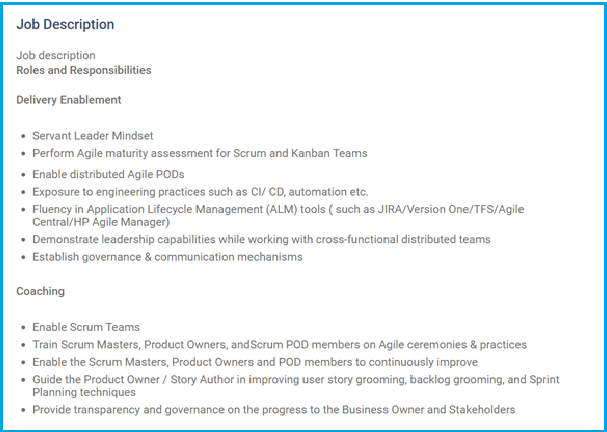
In this example of the Agile coach-process role, the coach is responsible for delivery enablement. He is expected to perform this role by training Scrum Masters, Product Owners, and POD members on the relevant Agile ceremonies and practices. As a coach, he is also responsible for guiding the Product Owner on improving user story grooming.
The technical and non-technical skills required to achieve these goals are knowledge of engineering practices such as CI/CD, automation, expertise in Application Lifecycle Management tools such as JIRA, Version One, and others. The Agile coach-process is expected to have leadership qualities and a servant-leader mindset.
It is the responsibility of the Agile coach to establish governance and communication mechanisms to provide transparency in progress to the Business owner and various stakeholders.
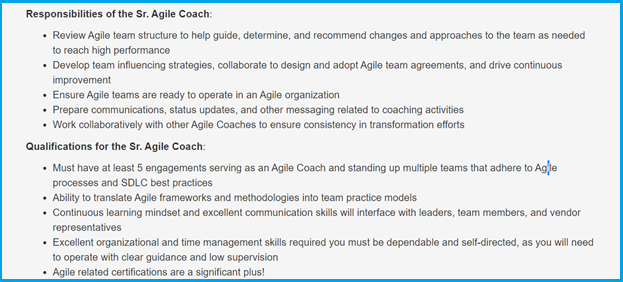
In this example, the Agile process coach is expected to work cohesively with other Agile coaches in the organization for a consistent transformation to Agile. At the team level, he is responsible for ensuring that the teams under his purview are empowered to work with Agility. To affect this, the Agile process coach suggests relevant changes in the existing team-structure and approaches.
The skill-sets relevant for this role are excellent organizational and time management skills. Also, he needs to be a continuous learner with impeccable communication skills. Since the Agile process coach will not be under continuous supervision, he needs to be a responsible and self-directed individual.
The technical skill-sets for this role experience in Agile coaching roles and SDLC best practices. He should be capable of translating various Agile frameworks into team practice models. It is beneficial to have relevant Agile-related certifications.
If we look at the above Agile process coach roles, we see that although the underlying theme is governance-related activities, there is a subtle difference in the responsibilities of the coach. The expectations of each organization are different from the role labeled, “Agile process coach.”
Therefore, when seeking the job of an Agile process coach, it is important to study the job description and what is expected of the Agile coach. And, then check if your skill sets and experience are aligned with the needs of the client.
Enables the transition of project delivery to Agile.
Role:
To ensure the successful delivery of business value at a sustainable pace. Enable Agile adoption by teaching, mentoring, and coaching teams in Agile-based frameworks. Work with Agile Center of Excellence and Stakeholders to enable agility.
Responsibilities:
KPI
In this example, Agile Coach-Delivery is responsible for empowering teams in an Agile way of working by coaching them to develop relevant skills and practices. He is required to collaborate with the Center of Excellence to identify roadblocks and resolve them. He is responsible for assessing and enhancing the Agile maturity of teams by identifying the knowledge gaps and addressing them with relevant training.
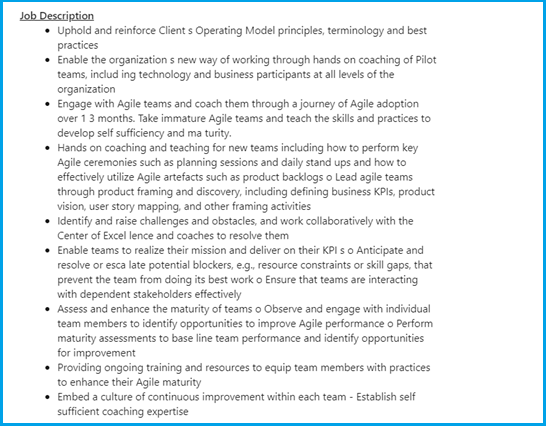
The Agile Coach-Delivery is expected to lead teams to establish self-sufficient coaching expertise.
An Enterprise coach is responsible for the transition of the entire organization to Agility.
Role:
An Enterprise Agile coach acts as a catalyst for identifying and applying new ways of working. Enables organizations to design and implement an effective transformation roadmap. The role of an Enterprise Agile coach is a strategic one wherein he integrates the Agile transformation process with the organization’s core business which enables Business Agility.
Responsibilities:
KPI
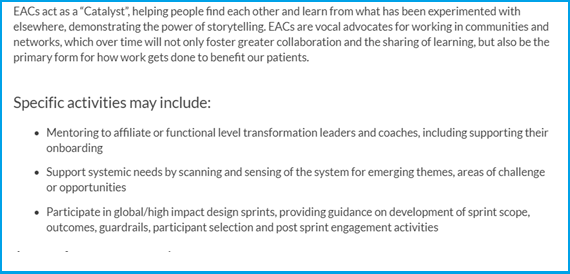
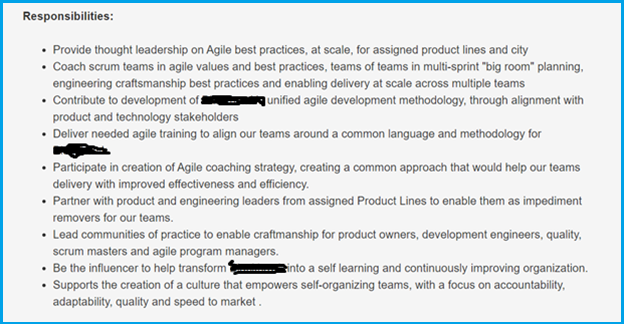
In this particular example of an Enterprise Agile Coach, the coach is expected to guide the teams for enterprise-level Agility based on his prior experience.
The Enterprise Agile coach is responsible for mentoring functional level transformation leaders while also supporting the on-boarding process for these leaders. He is expected to provide thought leadership on the best Agile practices for the organization. The Enterprise Agile Coach is responsible for creating an Agile coaching strategy for diverse teams to enhance efficiency and effectiveness. He is responsible for developing a unified Agile development methodology and training diverse teams around it. It is his responsibility to empower product and engineering leaders to remove impediments.
The ultimate objective of the coach is to transform the organization into self-learning and continuously improving one.
Although I have defined different Agile coach roles with the relevant skill-sets and certifications required, in actual practice, you may find an overlap between different roles.
What is expected of you as an Agile coach entirely depends on the client and the stage of transition to Agile the organization is in.
You can start your career as an Agile coach if you have a basic understanding of Agile and some experience on an Agile team.
It is beneficial if you have worked as a Scrum Master, Product Owner, or a professional in an Agile leadership role.

You may aim to get formally trained on Agile Coaching competencies by attending our ICAgile Certified (ICP-ACC) and ICAgile Certified Professional – Coaching Agile Transitions (ICP-CAT) Agile coaching program. These programs are designed to enable you to understand concepts that empower you to carve your Agile coaching career. This education program is well-recognized and has a good standing in the industry.

| Name | Date | Place | – |
| CSM Certification and Training | 12 – 13 April 2025 | Bangalore | More Details |
| CSM Certification and Training | 26 – 27 April 2025 | Pune | More Details |
| CSM Certification and Training | 3 – 4 May 2025 | Delhi | More Details |